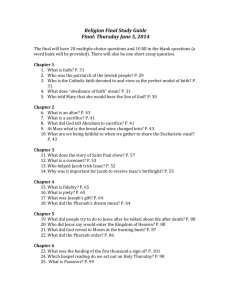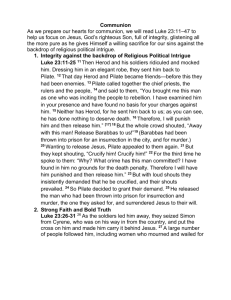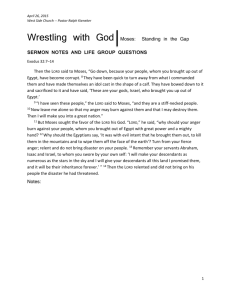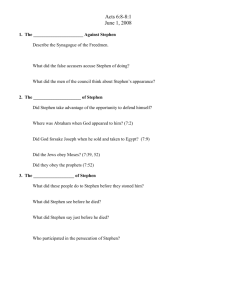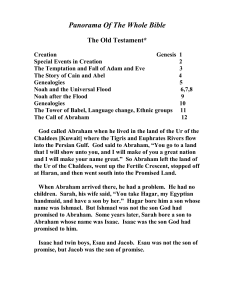acts7_11
advertisement
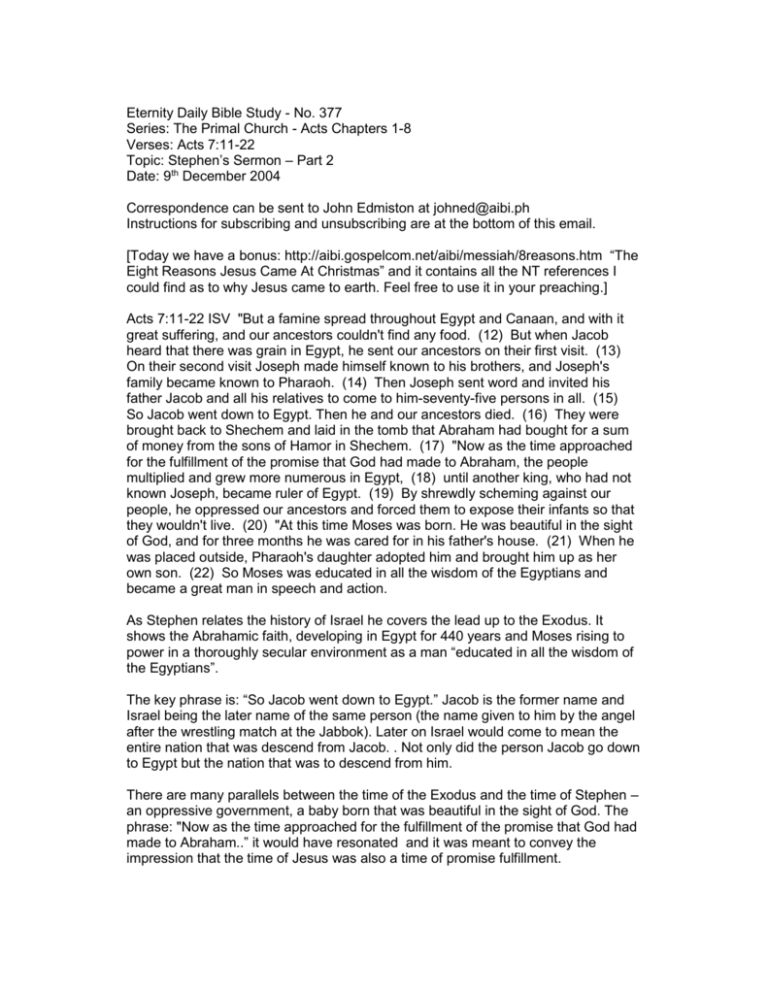
Eternity Daily Bible Study - No. 377 Series: The Primal Church - Acts Chapters 1-8 Verses: Acts 7:11-22 Topic: Stephen’s Sermon – Part 2 Date: 9th December 2004 Correspondence can be sent to John Edmiston at johned@aibi.ph Instructions for subscribing and unsubscribing are at the bottom of this email. [Today we have a bonus: http://aibi.gospelcom.net/aibi/messiah/8reasons.htm “The Eight Reasons Jesus Came At Christmas” and it contains all the NT references I could find as to why Jesus came to earth. Feel free to use it in your preaching.] Acts 7:11-22 ISV "But a famine spread throughout Egypt and Canaan, and with it great suffering, and our ancestors couldn't find any food. (12) But when Jacob heard that there was grain in Egypt, he sent our ancestors on their first visit. (13) On their second visit Joseph made himself known to his brothers, and Joseph's family became known to Pharaoh. (14) Then Joseph sent word and invited his father Jacob and all his relatives to come to him-seventy-five persons in all. (15) So Jacob went down to Egypt. Then he and our ancestors died. (16) They were brought back to Shechem and laid in the tomb that Abraham had bought for a sum of money from the sons of Hamor in Shechem. (17) "Now as the time approached for the fulfillment of the promise that God had made to Abraham, the people multiplied and grew more numerous in Egypt, (18) until another king, who had not known Joseph, became ruler of Egypt. (19) By shrewdly scheming against our people, he oppressed our ancestors and forced them to expose their infants so that they wouldn't live. (20) "At this time Moses was born. He was beautiful in the sight of God, and for three months he was cared for in his father's house. (21) When he was placed outside, Pharaoh's daughter adopted him and brought him up as her own son. (22) So Moses was educated in all the wisdom of the Egyptians and became a great man in speech and action. As Stephen relates the history of Israel he covers the lead up to the Exodus. It shows the Abrahamic faith, developing in Egypt for 440 years and Moses rising to power in a thoroughly secular environment as a man “educated in all the wisdom of the Egyptians”. The key phrase is: “So Jacob went down to Egypt.” Jacob is the former name and Israel being the later name of the same person (the name given to him by the angel after the wrestling match at the Jabbok). Later on Israel would come to mean the entire nation that was descend from Jacob. . Not only did the person Jacob go down to Egypt but the nation that was to descend from him. There are many parallels between the time of the Exodus and the time of Stephen – an oppressive government, a baby born that was beautiful in the sight of God. The phrase: "Now as the time approached for the fulfillment of the promise that God had made to Abraham..” it would have resonated and it was meant to convey the impression that the time of Jesus was also a time of promise fulfillment. The 400 years in Egypt was about the same length as the silence of the voice of God – the 400 years from the prophet Malachi to John the Baptist. The events were similar – the shrewd oppressor, the imperial government, the unfair conditions. By drawing the parallels it was indicating that “one like Moses” was about to emerge – in this case Christ. The literal famine in Jacob’s day also paralleled “the famine of the word of God” during these 400 silent years. The faith in these days was not “established” there was no land, no Torah, no temple. It was in fact a persecuted minority in a foreign land . All they owned in Canaan/Israel was a tomb! They lived and died as nomads. “So Jacob went down to Egypt. Then he and our ancestors died. (16) They were brought back to Shechem and laid in the tomb that Abraham had bought for a sum of money from the sons of Hamor in Shechem.” This would have reminded the hearers of the nomadic nature of Abrahamic faith – that faith can operate without any ‘establishment’ as well as with such things as the Temple (which God certainly helped build). Thus an establishment such as priesthood, a temple and a holy book were not necessary during the first 400 years of Judaism. Thus they could be discarded and the faith still retained. Stephen is therefore saying: “the patriarchs did not need your religious establishment to please God, and neither do we Christians.” Now it is very helpful to have a pastor, a church and a bible but these things are not bedrock essentials. Abraham did not need them, neither did the patriarchs or Joseph, and Jesus arranged their obsolescence (fulfilling and then voiding the Law and prophesying the destruction of the Temple). The basic relationship with God is by faith, and is not mediated through a priest, a place, a temple or a holy book. Moses was “beautiful in the eyes of God” despite being born in Egypt without priests or Torah or Temple. He was obviously approved by God but was without any of the rituals of Jewish Law! Not only that Moses grew up into a very capable and competent human being without any guidance from Jewish priests – in fact the pagan Egyptians educated him! A person can become mighty in word and action through the inner teaching by the Holy Spirit, within almost any educational system – even a very pagan one such as that experienced by Moses and Daniel. One of the NT doctrines is that the believer is individually taught by God, through the Holy Spirit, in his or her “heart” or conscience. The Law is ‘written on our hearts” by the Holy Spirit, so that we do not have need of a teacher and the things of God are revealed to us. (Hebrews 8:10, 10:16, 2 Corinthians 3:3, 1 John 2:20,27, 1 Corinthians 2:9-16) Thus Moses could grow up into a great man of God without any established religious institutions in his life. He did this through his personal faith relationship with God. So we see that in these verses Stephen has shown that nomadic, oppressed Abrahamic faith can operate quite well without any guiding institutions for hundreds of years and still produce a man as great as Moses. Since they all looked up to Moses as “the very greatest man of God” and this greatest man of God had been produced ENTIRELY WITHOUT THIER SYSTEM it was a death-blow to the need for that system. This was obviously anathema to the Sanhedrin, Stephen was getting into trouble, and Stephen would get into still more trouble when he discussed Moses as the rejected Messiah. More on that tomorrow. Blessings, John Edmiston Eternity DBS web-site: http://www.aibi.ph/eternity/ SEND A CHRISTMAS GIFT: Donations are always appreciated: http://www.aibi.ph/aibi/donate.htm You are receiving this email because you either subscribed on the website, or sent an email to the subscribe address. We do not subscribe people without their consent. To subscribe - send a blank email to: eternity-dbs-subscribe@strategicnetwork.org To unsubscribe - send a blank email to: eternity-dbs-unsubscribe@strategicnetwork.org Donations are always appreciated: http://www.aibi.ph/aibi/donate.htm
